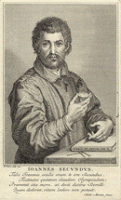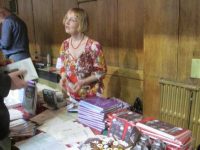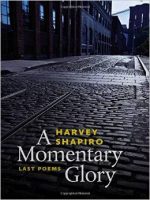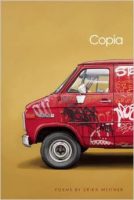September 23, 2014
Edited by David Sanders
Specimen Days
1536 – Janus Secundus, neo latin poet (Basia), dies at 24.
1707 – Vincenzo da Filicaja, Italian poet (b. 1642), dies.
1762 – William Lisle Bowles, English poet (14 Sonnets), is born.
1817 – Ramon de Campoamor Campoosorio, Spanish poet (Doloras), is born.
1821 – Cyprian K Norwid, Polish painter/poet/playwright (Wanda), is born.
1930 – Józef Krupiński, Polish poet (d. 1998), is born.
1951 – Georges Rency, Belgian poet/literature, dies at 75.

Neaera does not give kisses, she gives nectar,
She gives the sweet-smelling dew of the soul,
She gives nard and thyme and cinnamon,
And the honey which the bees collect on the ridges
of the Hymettus or on rosy Cecrops
and hither and thither with their virgin wax
cover the wall with a wicker-work basket.
Which if, many and devourable, were given to me,
I might suddenly find myself among the immortals,
and delight in the feasts of the mighty gods.
—from "Kiss No. 4" by Janus Secudnus (1511–1536)
I might suddenly find myself among the immortals,
and delight in the feasts of the mighty gods.
—from “Kiss No. 4” by Janus Secudnus (1511–1536)
World Poetry
Tibetan Poet and Activist Detained

Yesterday we came across this disappointing news item from Mid Day. Poet and activist Tenzin Tsundue was detained by police ahead of Chinese President Xi Jinping’s visit to India. More.
Tenzin Tsundue, the Tibetan poet and activist, was detained by police.
Recent Reviews
‘A Progressive Education’ by Richard Howard

by Eric Dean Wilson
Fans of the “School Days” sequence in Richard Howard’s 2008 National Book Award-nominated Without Saying will be glad to see that his newest collection, A Progressive Education, comprises a more in depth visit to the students of Park School, a “progressive education” middle school. Several poems are identical to sections in the original sequence, but in his new book, Howard broadens the character base. Notably, he has also moved his cast of students from fifth grade to sixth grade, with poems that used to say “fifth grade” now saying “sixth grade,” a harmless change that does not disrupt the acute syllabics the poet is famous for.More.
A Ted Hughes Bestiary: Poems Selected by Alice Oswald – Book Review: Joyous, vigorous observations of the natural world
by Fiona Sampson
A Ted Hughes Bestiary is a thematic collection of 100 of the late laureate's poems. Hughes's animal poetry is arguably the joyous best of him, and is full of a country-dweller's lived experience. Whether a damselfly in "Performance", a "Midget puppet-clown, tranced on his strings, /In the nightfall pall of balsam", or the "plungings, and spray-slow explosions" of "A Dove", his creatures are completely, and delightedly, realised. Country knowledge is built up through repeated encounters with beasts, both farmed and wild. This book is full of such encounters, from the famous dream of the "Thought Fox" that inspired Hughes's vocation, to a late "Epiphany" from Birthday Letters, in which he denies an orphaned fox-cub, himself, and his failing marriage by not taking the creature home. More.
Black Country Review – Liz Berry's Impressive First Collection
by Kate Kellaway
Black Country is an extraordinary debut and rooted in place. When you close the book, you can still see the Black Country in your mind's eye, as if all the poems in it were coming together to form a continuous landscape, a single yet varied view. We are in the West Midlands, a world of closed pits and the memory of coal dust and there is a sootiness that contrasts with a fresher and more rural scene of trees, moss, mushrooms. There is a particularly memorable poem about mushrooming, Woodkeeper, which manages to be comic (there is a certain amount of rolling about on the forest floor) and erotic at the same time. Less predictably, dancing across this landscape, are two poems about shoes – moving in metaphorical quickstep – a silver pair and a scarlet. The scarlet, in particular, stands out against the established darkness of this collection. More.
Richard Howard’s A Progressive Education comprises an in depth visit to the students of Park school, a “progressive education” middle school.
Broadsides
Confessionalism Birthed from Feminism

by Melinda Wilson
In her 1971 essay “When We Dead Awaken: Writing as Re-Vision,” Adrienne Rich refers to formalism as “asbestos gloves, it allowed [her] to handle materials [she] couldn’t otherwise pick up bare-handed.” Indeed, poets of the 1950s and 1960s struggled to write personal poetry and poetry that could address socially restricted subjects. Male poets in this position, Robert Lowell, for example, yearned to break free from the constraints of New Criticism, a school of criticism prominent in the 1940s and 50s that effectively detached the author from his or her work. Other male poets who belonged to the Confessional movement, namely W.D. Snodgrass and John Berryman, wrote autobiographical poetry that departed considerably from the predominant impersonality that existed in poetry, perhaps residue of the Modernist period. These poets wrote poems that they felt characterized the circumstances of their time. More.
What Do Pamphlet Publishers Look For?

by Helena Nelson
This was one of the questions at the Poetry Book Fair last Saturday. The Book Fair was exceptionally good. The atmosphere was hustling and bustling but absolutely friendly and unhierarchical. Faces you know well from the backs of prize-winning bookjackets rubbed shoulders with faces you’d never seen before. Hang on—faces can’t rub shoulders with faces. But you know what I mean. More.
Poets of the 1950s and 1960s struggled to write personal poetry and to address socially restricted subjects with the advent of New Criticism.
Drafts & Fragments
Middlebury Introduces the Bread Loaf Translators’ Conference

The new conference will model the notable Bread Loaf Writers’ Conference, which as been in existence since 1926 and “is the oldest writing conference in America,” according to Bread Loaf’s website. Translators will gather for one week, during which time they will engage in lectures, workshops, classes, and readings. The development of this new conference, offering a specific focus on translation, supports recognition “that translators require the same training and skills as writers.” More.
16 September (1913): Ezra Pound to Harriet Monroe

Writing from London (or, as he puts it below, “this stupid little island”), Ezra Pound dashes off a short missive to Harriet Monroe, the founding publisher and editor of Poetry magazine, on American and British ignorance of the French literary tradition. Pound found in Monroe an early champion of his work (she had published his “In a Station of the Metro” earlier that spring), and would convince her the following year to publish T.S. Eliot’s “The Love Song of J. Alfred Prufrock.” More.
Bread Loaf will launch its first annual Translators’ Conference this June at Middlebury College.
Poetry In the News
Clive James Adds New Poem to Valedictory Work

“Your death, near now, is of an easy sort / So slow a fading out brings no real pain,” writes Clive James in a new poem in which the terminally ill author contemplates how the arrival of autumn will “end the game” for him. Diagnosed with leukaemia and emphysema in 2010, James has over the last year given readers a glimpse into his life through his poetry, last month describing his love for his wife, academic Prue Shaw, in The Emperor’s Last Words. More.
MacArthur ‘Genius’ Money Lives On In A Poet’s House

The winners of this year’s MacArthur Fellowships — the “genius grants” — have been announced, and the recipients include lawyer Mary Bonauto with the Boston-based group Gay & Lesbian Advocates & Defenders and Harvard mathematician Jacob Lurie. All 21 winners will receive $625,000 over five years — no strings attached. If you’re like us, perhaps you’ve wondered what past MacArthur fellows have done with their money? Well, a 1992 winner’s MacArthur legacy continues to live on in western Massachusetts. More.
NC Unveils New Process for Picking Poet Laureate
North Carolina is looking for nominations for the next poet laureate — and quickly — after a decision by Gov. Pat McCrory on the position over the summer caused an uproar in the arts community. McCrory appointed Valerie Macon of Fuquay-Varina as poet laureate, a decision that stunned writers in the state. Macon, a disability examiner at the Department of Health and Human Services, had self-published two books and resigned shortly after the announcement. McCrory made the nomination without any input from the North Carolina Arts Council. This time, the state said in an announcement, the poet laureate selection process will be led by N.C. Department of Cultural Resources Secretary Susan Kluttz. More.
WCU Poetry Director’s Removal Results in Canceled Conference
The normally genteel world of iambic pentameter and free verse has been interrupted – at least for the time being – at West Chester University’s Poetry Center. The university announced Tuesday it is canceling its 2015 Poetry Conference after the Poetry Center’s director, Kim Bridgford, was “reassigned to full-time teaching,” according to Pam Sheridan, the university’s public relations director. The conference will be in hiatus for 2015, Sheridan said, but the university expects to have it running again in 2016. More.
“Your death, near now, is of an easy sort / So slow a fading out brings no real pain”
New Books
A Momentary Glory: Last Poems by Harvey Shapiro

[Hardcover ] Wesleyan, 124 pp., $24.95
The distinguished poet Harvey Shapiro passed away on January 7, 2013. The poems in this book, many of them previously unpublished and discovered only after his death, are a great gift, and the final confirmation of his extraordinary talent. Edited by Shapiro’s literary executor, the poet and critic Norman Finkelstein, these last poems bear an unprecedented gravitas, and yet they are as supple, jazzy, and edgy as Shapiro’s earlier work. All the themes for which he is known are beautifully represented here. There are poems of his experiences in World War II, the erotic life, and of daily moments in Brooklyn and Manhattan, all in search of a worldly wisdom and grace that the poet calls “a momentary glory.” As Shapiro tells us, the poem “Is an Egyptian / ship of the dead, / everything required / for life stored / in its hold.”
The New Testament by Jericho Brown
[Paperback] Copper Canyon Press, 110 pp., $17.00
“In his second collection, The New Testament, Brown treats disease and love and lust between men, with a gentle touch, returning again and again to the stories of the Bible, which confirm or dispute his vision of real life. 'Every last word is contagious,' he writes, awake to all the implications of that phrase. There is plenty of guilt—survivor’s guilt, sinner’s guilt—and ever-present death, but also the joy of survival and sin. And not everyone has the chutzpah to rewrite The Good Book.”—NPR.org
Copia by Erika Meitner

[Paperback] BOA Editions Ltd. ,100 pp., $16.00
"The poems in Copia are about what is and what is almost-gone, what is in limbo and what won't give way, what is almost at rock bottom but still and always brimming with the possibility of miracle."—Rachel Zucker
Faithful and Virtuous Night: Poems by Louise Glück
[Hardcover] Farrar, Straus and Giroux, 80 pp., $23.00 Louise Glück is one of the finest American poets at work today. Her Poems 1962–2012 was hailed as “a major event in this country’s literature” in the pages of The New York Times. Every new collection is at once a deepening and a revelation. Faithful and Virtuous Night is no exception. You enter the world of this spellbinding book through one of its many dreamlike portals, and each time you enter it’s the same place but it has been arranged differently. . . . Faithful and Virtuous Night tells a single story but the parts are mutable, the great sweep of its narrative mysterious and fateful, heartbreaking and charged with wonder.
Wolf Centos by Simone Muench

[Paperback] Sarabande Books, 72 pp., $14.95
Wolf Centos is comprised of centos, a patchwork form that originated around the 4th century. The form is one which re-configures pre-existing poetic texts into new systems of imagery and ideas. The author is able to place poets in conversation with one another across centuries and across continents. Though the poems are explicitly sutured together by the motif of the wolf, they are also linked by other elements, particularly motifs of language, loss, desire, and transformation. Wolf Centos is ultimately elegiac as it oscillates between transformation and stasis, wildness and domesticity, death and beauty, damage and healing, because ultimately our lives constantly shift between these polarities as well. The ultimate knowledge of the poems is that as we age and experience loss, we must retain our “wildness”—the wolf’s wilderness—inside us. In this way, the wolf becomes a symbol of a threshold, a transformative space.
Just over a year and half since his death, Harvey Shapiro’s final poems are published in A Momentary Glory: Last Poems.
Correspondences
Interview with Poet Kevin Young
By Luke Fenchel
Kevin Young is a prolific poet, editor, and non-fiction writer with a Guggenheim “Genius” Grant, American Book Award, and a fellowship from the National Endowment for the Arts. His Book of Hours was released earlier this year to rave reviews. The non-fiction Grey Album: on the Blackness of Blackness is part mix-tape, part manifesto, and wholly entertaining exploration of creativity. Ithaca College will host a reading on Wednesday, September 17 for an event that is free and open to the public. I spoke to Kevin Young from his home in Atlanta, and he explained he would draw from a wide range of material: “I will definitely be reading from Book of Hours, I may be reading newer poems, and I may reach back to Dear Darkness.We’ll see.” More.
Writing Poetry to Save Your Life: An Interview with Maria Mazziotti Gillan
by Loren Kleinman
Maria Mazziotti Gillan is a recipient of the 2014 George Garrett Award for Outstanding Community Service in Literature from AWP, the 2011 Barnes & Noble Writers for Writers Award from Poets & Writers, and the 2008 American Book Award for her book, All That Lies Between Us (Guernica Editions). She is the founder /executive director of the Poetry Center at Passaic County Community College in Paterson, NJ, and editor of the Paterson Literary Review. She is also director of the Binghamton Center for Writers and the creative writing program, and professor of English at Binghamton University-SUNY. More.
'Rice Means Tears in NK,' Says Defector-Poet
by Seol Song Ah
Lee Ga Yeon is defector from North Korea. She was born in Haeju, South Hwanghae Province, and escaped North Korea in 2011 and settled in the South. Lee began her literary career in December 2012 through a Korean literary competition, and went on to receive the Unification Minister’s Prize for Poetry the following year. More.
Small Press Spotlight: R.A. Villanueva

by Rigoberto González
R.A. Villanueva is the author of Reliquaria, winner of the Prairie Schooner Book Prize. He is also the winner of the inaugural Ninth Letter Literary Award for poetry and a founding editor of Tongue: A Journal of Writing & Art. His writing has appeared or is forthcoming in Five Points, The Common, AGNI, Virginia Quarterly Review, and elsewhere. More.
Rigoberto González puts the spotlight on R.A. Villanueva, the Prairie Schooner Book Prize winner.
Envoi: Editor’s Notes
‘Jatte’ by Charles Bernstein
“¢ Δ[1]( [1]´TÉNÃ0½#ñ‘¯(qË!´–#T¢|€
Okay. This isn't to everyone's taste, including mine. But it's worth giving it a listen if only for a few moments to hear what such a creation sounds like. And as for the claim that it "answers the call for a popular poetry that can galvanize the engagement of ordinary people," you can listen further and be the judge of that.
Charles Bernstein’s ‘Jatte’ “answers the call for a popular poetry that can galvanize the engagement of ordinary people.”